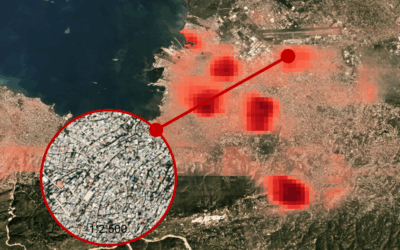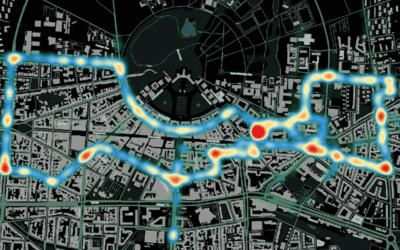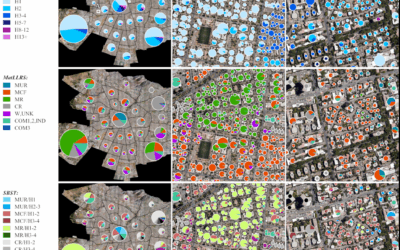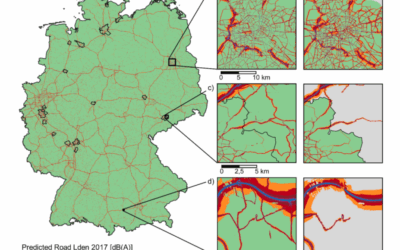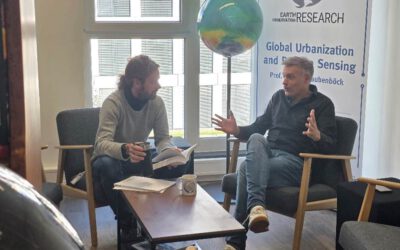New publication on the development of a landslide early warning system prototype in an informal settlement
Within the BMBF inform@Risk (Strengthening the Resilience of Informal Settlements against Slope Movements) a landslide early warning system prototype has been developed in the informal settlement of Bello Oriente in Medellín, Colombia. What is special about this development is that it is the first early warning system prototype of its kind in an informal settlement in the world, as the newspaper “el Colombiano” headlined.
Now, experiences on the complex processes of developing and implementing such a socio-technological system have been published in the journal “Natural Hazards and Earth System Sciences (NHESS)”. The paper titled “Insights into the development of a landslide early warning system prototype in an informal settlement: the case of Bello Oriente in Medellín, Colombia” was just published by Christian Werthmann, Marta Sapena, Marlene Kühnl, John Singer, Carolina Garcia, Tamara Breuninger, Moritz Gamperl, Bettina Menschik, Heike Schäfer, Sebastian Schröck, Lisa Seiler, Kurosch Thuro, and Hannes Taubenböck.
Here is the link to the full article: https://nhess.copernicus.org/articles/24/1843/2024/
The living-lab research work has been carried by multi- and interdisciplinary participants from Germany and Colombia: The Leibniz Universität Hannover (coordinator), Technische Hochschule Deggendorf, Technische Universität München, AlpGeorisk, Sachverständigenbüro für Luftbildauswertung und Umweltfragen and Deutsches Zentrum für Luft- und Raumfahrt e.V. in collaboration with our EORC in Würzburg. Colombian partners are EAFIT University – urbam, Departamento Administrativo de Gestión del Riesgos de Desastres – DAGRD, Alcaldía de Medellín, Área Metropolitana del Valle de Aburrá, Departamento Administrativo de Planeación, Secretaría de Medio Ambiente, Secretaría de Infraestructura Física, Sistema de Alerta Temprana del Valle de Aburrá, Sociedad Colombiana de Geología, Colectivo Tejearanas, Corporación Convivamos, Fundación Palomá, Red Barrial Bello Oriente and residents of Bello Oriente.
Here is the abstract of the paper: The global number of vulnerable citizens in areas of landslide risk is expected to increase due to the twin forces of climate change and growing urbanization. Self-constructed or informal settlements are frequently built in hazardous terrain such as on landslide-prone slopes. They are characterized by high dynamics of growth, simple construction methods and strong social dynamics and are exposed to unsteady political approaches. Landslide early warning systems (LEWSs) can contribute to decreasing their vulnerability, but precise, affordable and culturally integrated LEWSs need to be further developed. In this paper, we present a 4-year living-lab research project called Inform@Risk that aimed to develop a LEWS prototype in the neighborhood of Bello Oriente, located on the urban–rural border of Medellín, Colombia. Its research team is composed of landscape architects, geo-engineers, and remote sensing and geo-informatics experts. The research team collaborated with a multitude of stakeholders: civil society, private enterprises, non-governmental agencies and various branches of government. A preliminary LEWS with the last functionalities still to be developed has been designed, implemented and handed over to the government. It has entered a test and calibration phase (i.e., warning-threshold development, procedures for warning and alert dissemination through the sensor system), which is on hold due to legal constraints. Our first findings indicate that the integrative development of technical aspects of a LEWS in informal settlements can be challenging, albeit manageable, whereas the level of social and political support is beyond the control of the designer. Steady political will is needed to increase technical capacities and funding of the operation and maintenance of an increased amount of monitoring equipment. Social outreach has to be continuous in order to inform, train, maintain the trust and increase the self-help capacities of the often rapidly changing population of an informal settlement. Legal requirements for a transfer of academic research projects to municipal authorities have to be clear from the start. Satisfying replacement housing options for the case of evacuation have to be in place in order to not lose the overall acceptance of the LEWS. As political will and municipal budgets can vary, a resilient LEWS for informal settlements has to achieve sufficient social and technical redundancy to maintain basic functionality even in a reduced-governmental-support scenario.



